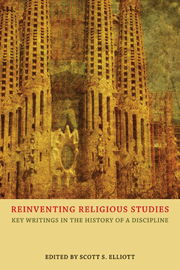Book contents
- Frontmatter
- Contents
- Introduction
- 1 For such a time as this: the Council of Societies for the Study of Religion, 1969–2009
- Part I Inventing and reinventing the field of religious studies
- Part II Method and theory in religious studies
- Part III Teaching religion
- Part IV Women and the bible in religious studies
- Part V Religion and religious studies in civic life
- 24 Contemporary socio-political change and the work of religious studies
- 25 The scholar of religion as a cultural critic: perspectives from Denmark
- 26 What are the humanities and why do they matter? The case of religion and public life
- 27 Response to Gary Lease's “What are the humanities, and why do they matter?”
- 28 So, what are we professing here? Religion, the liberal arts, and civic life
- 29 Response to Raymond B. Williams's “So, what are we professing here? Religion, the liberal arts, and civic life”
- 30 Response to Raymond B. Williams's “So, what are we professing here? Religion, the liberal arts, and civic life”
- 31 Response to Raymond B. Williams's “So, what are we professing here? Religion, the liberal arts, and civic life”
- 32 Rejoinder
- Part VI Religious studies and identity politics
- Part VII Islam and 9/11
- Bibliography
- Acknowledgments
- Index
32 - Rejoinder
from Part V - Religion and religious studies in civic life
- Frontmatter
- Contents
- Introduction
- 1 For such a time as this: the Council of Societies for the Study of Religion, 1969–2009
- Part I Inventing and reinventing the field of religious studies
- Part II Method and theory in religious studies
- Part III Teaching religion
- Part IV Women and the bible in religious studies
- Part V Religion and religious studies in civic life
- 24 Contemporary socio-political change and the work of religious studies
- 25 The scholar of religion as a cultural critic: perspectives from Denmark
- 26 What are the humanities and why do they matter? The case of religion and public life
- 27 Response to Gary Lease's “What are the humanities, and why do they matter?”
- 28 So, what are we professing here? Religion, the liberal arts, and civic life
- 29 Response to Raymond B. Williams's “So, what are we professing here? Religion, the liberal arts, and civic life”
- 30 Response to Raymond B. Williams's “So, what are we professing here? Religion, the liberal arts, and civic life”
- 31 Response to Raymond B. Williams's “So, what are we professing here? Religion, the liberal arts, and civic life”
- 32 Rejoinder
- Part VI Religious studies and identity politics
- Part VII Islam and 9/11
- Bibliography
- Acknowledgments
- Index
Summary
I constructed the lecture, “So, What Are We Professing Here?”; to be provocative, so I am enormously grateful that it succeeded in evoking thoughtful responses from my colleagues in this venture. They raise important issues. The lecture also attempted to move us a small step beyond the tired old dichotomy between a supposed neutral secularism and a despised narrow confessionalism in teaching by positing an intellectual grounding and a civic responsibility for the study of religion. The responses demonstrate, however, how difficult it is to move into that middle ground, pushing me to one side with phrases like “civic religion,’ “unshakable allegiance,’ “siege mentality,’ “share our religious beliefs,” “guru,” and “practicing meditation” (some words in quotation marks that are nowhere in my lecture). I realized, even as I spoke the words, that I risked marginalization in the academy when I used as an illustration “willingness to take a stance as a Methodist Christian or an Ismaili Muslim,” even though only the “Methodist Christian” part was quoted. That statement was in the context of students and teachers being free and able to make judgments—as distinct from holding opinions—about everything one studies from the best edition of a Greek verse to, perhaps, the best way to conduct one's life in a particular circumstance. That does not require propagation of a religion, but it does require careful study and a willingness to make public judgments.
- Type
- Chapter
- Information
- Reinventing Religious StudiesKey Writings in the History of a Discipline, pp. 197 - 198Publisher: Acumen PublishingPrint publication year: 2013



